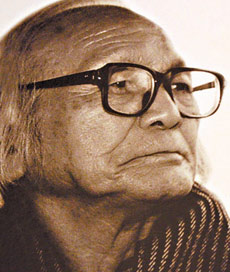Nanjing pays tribute to 'Conscience of Japan'
NANJING: As a city closely connected to Japanese war veteran Shiro Azuma who is often referred to as the Conscience of Japan, Nanjing will send a delegation to his funeral today.
"The three will on behalf of both our government and citizens pay homage to the memory of Mr Azuma," said Lin Yi of the Department of Foreign Affairs of the Nanjing Municipal Government.
 Shiro Azuma: Warrior fighting for justice |
Azuma died on Tuesday at the age of 93 in a Kyoto hospital.
He served in the Japanese Imperial Army in 1937, when invading troops occupied Nanjing, then the capital of China, and launched a six-week massacre. More than 300,000 Chinese, mostly civilians, were slaughtered.
Ridden by guilt, Azuma published his wartime diary in 1987 to make public the atrocities committed by Japanese soldiers.
Azuma was constantly threatened by Japanese rightists and sued for libel charges in 1993. He lost the case but kept telling the truth about the war.
He visited China seven times since 1987 to apologize and help Chinese scholars find evidence of the Japanese soldiers' brutality.
His diary was translated and published in China in 1999.
"He was a warrior fighting for justice. He was a sincere friend of Chinese people," Jing Shenghong, a history professor at Nanjing Normal University who had close contact with Azuma during his research, was quoted by Xinhua as saying.
"His death is a loss for both those in Japan who dared to acknowledge the truth of history and all righteous people," said Zhu Chengshan.
"I used to hate the Japanese so much," said 78-year-old massacre survivor Jiang Fugen. "But when I saw the old Azuma in tears, bowing and kneeling before us in repentance, I couldn't hold back my tears," he told China Daily.
Five of Jiang's family members were killed by the Japanese soldiers during the massacre.
Yin Yueping, the former vice-curator of the Nanjing memorial hall, recalled that during Azuma's first trip to China in December 1987, he was silent most of the time.
"He seldom talked and his eyes were always full of tears. He told me that he felt so guilty while returning to Nanjing, a city where his fellow soldiers killed, looted, raped and burnt 50 years ago," said Yin, who accompanied Azuma during his visits to Nanjing.
"He was really fragile then. But the deep remorse and sense of guilt compelled him to come and apologize time and again. His sincerity would have moved anyone. If most people in Japan were as righteous as Azuma, there would not be any unpleasantness between the two countries," said Yin.
Yin said that Azuma was preparing for his eighth trip to Nanjing before he fell ill last November.
Azuma hailed as model for countrymen
China yesterday expressed condolences over the death of Japanese war veteran Shiro Azuma, hailing him as a role model for his countrymen.
Foreign Ministry spokesman Qin Gang told a regular press conference that Azuma was one man who dared to acknowledge the truth of history and wanted to improve relations between China and Japan.
He said Azuma's conscience, courage and righteousness had won the respect of the Chinese people.
"I believe there are more people in Japan like Azuma, who are making unremitting efforts to maintain the friendship between the two countries in line with the spirit of 'taking history as a mirror and looking forward to the future," Qin said.
He also made it clear that Japanese Prime Minister Junichiro Koizumi's visits to the Yasukuni Shrine a symbol of Japanese militarism are totally unacceptable.
On Wednesday, Koizumi once again defended his repeated visits to the shrine where Class-A war criminals of World War II are honoured but said he was committed to developing friendly ties with China.
Qin reiterated that China is not responsible for the current stalemate and is always in favour of dialogue. However, communication and co-operation between the two countries require the proper political conditions and atmosphere.
The spokesman also refuted some Japanese reports that Japan is investing in Chinese gas exploration projects in the East China Sea and that the two countries agreed to share the interests according to a certain proportion.
Qin said the two countries agreed on joint exploration during the third round of gas talks in Tokyo in October. "But details such as the capital and the distribution of the interests haven't been touched upon yet," he said.
News&Opinion
 more
more- Graduation Ceremony Held in Confucius Institute ...
- Last Class in Jinan High School before College E...
- African culture to be promoted in China
- Investigation on How Much You Love China
- 'Never Judge a Country by its Size'
- Pakistani student hospitalised in China seeks he...
- Welcome to China, but Please Do Respect us
- An antidote to money-oriented education
Policy&Laws
Zhejiang University- 115th Anniversary Celebrati...
On the evening of May 29, a dinner gala celebrating the 115th annive...
Chinese Learning and the Distribution of Enrolle...
There are three categories in the universities in Beijing: 1. Colle...
Chapter I General Provisions
Article 1 This Law is formulated with a view to safeguarding the so...





 print
print  email
email  Favorite
Favorite  Transtlate
Transtlate 







